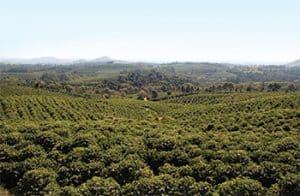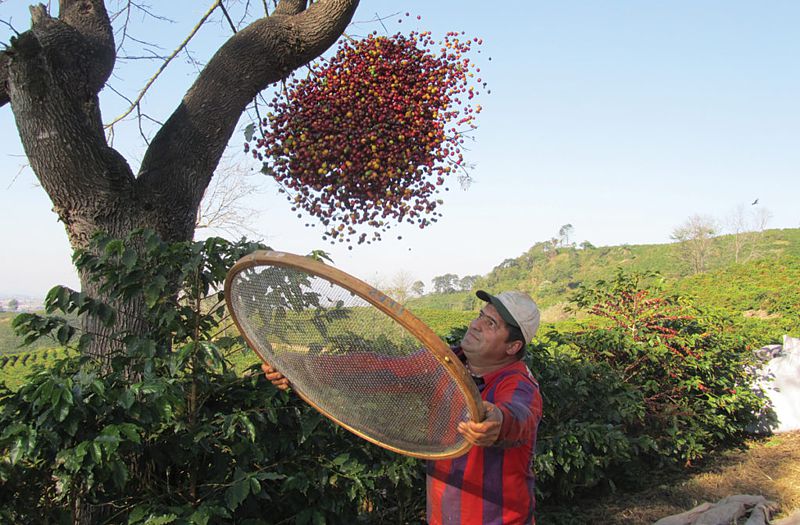On the day I spoke to Jose Francisco on 8 May, Monte Alegre Coffee was a hive of activity on the first day of harvest. Despite the early mark, conditions were “perfect” – a dry 26°C during the day, 14°C at night, and low 45 per cent moisture.
The cherries were ripe and mature, ready for round one of picking. It’s a process that will go until the end of August.
About 35 per cent is mechanically harvested, and 65 per cent done by hand, a balance of technology and craft to ensure the best cherries are picked.
Brazil’s special climatic conditions are one of the reasons the country has a reputation as one of the biggest coffee producers in the world, and an emerging specialty coffee scene.
Unlike Colombia and Central America’s temperate weather conditions that impact on what type of processing methods they use (which is why you wont see top naturals or honey processed coffees too often), Brazil’s almost perfect conditions allow farmers to produce high quality natural, honey processed, semi washed, and fully washed coffees.
Monte Alegre is a fourth-generation family farm in the South Minas Gerais region of Brazil. Owned by the Vieira family, Monte Alegre celebrated 100 years of production in 2017. It focuses on the production of specialty coffee – coffees that score over 80 points. Jose says there’s even some talk of Brazil raising its specialty scoring to 82 points, but that’s still up for discussion.
Monte Alegre grows more than 50 varietals, including the most widely used in Brazil from the Mundo Novo and Catuai families.
 On the Mundo Novo side, Monte Alegre grows variations including Mundo Novo Acaiá, and under the Catuai family tree are yellow and red Catuai, and yellow Bourbon. For the past 10 years, its also been growing Topázio – a genetic crossing of yellow Catuai and Mundo Novo.
On the Mundo Novo side, Monte Alegre grows variations including Mundo Novo Acaiá, and under the Catuai family tree are yellow and red Catuai, and yellow Bourbon. For the past 10 years, its also been growing Topázio – a genetic crossing of yellow Catuai and Mundo Novo.
Monte Alegre processes natural processed coffee (pick and naturally dried), of which accounts for 70 per cent of Monte Alegre’s processing; and washed processed coffees, which breaks down into three sub-categories:
- Pulped natural: a process of selecting the best cherries, pulping them, and drying with mucilage attached.
- Fully washed: the method of picking cherries, pulping them, and placing them in using wet or dry fermentation.
- Semi washed: the method of picking the cherries, pulping them, and removing the mucilage of the cherry with a mechanical demucilator machine. Removing the mucilage reduces drying time and the risk of fermentation. This processing method is typically used when weather conditions aren’t at their peak. If there is high moisture in the air, warm days or rainfall, there is a higher risk of fermentation. Most commodity-traded washed coffee in Brazil uses this method of processing.
The use of advanced technology is playing a large role in the quality control of specialty procedures. Monte Alegre screen sizes its cherries and uses electronic machines to identify the ripeness of beans to ensure they are good quality to pick.
Jose uses a new computer software developed in Brazil to replicate the same conditions on drying patios, in designated driers.
“Using automatic dryers, we can monitor and control the temperature and desired drying curve thanks to a high-tech automatic system, just like a roasters monitors a roast curve,” Jose says. “The computer program automatically turns heat on and off as required, and manages the temperature inside the automatic drier. We used to have one person dedicated to manually regulating airflow and temperature control of each drier, and now we can do it all with a computer. It’s having a huge impact on our quality control.”
Despite the best efforts of Monte Alegre to produce top quality specialty coffee, Jose says the farm still only produces 40 per cent specialty.
“We focus on the production on specialty coffees, but it’s not always possible to produce only top quality specialty. During the selection of the coffee cherries, we get cherries that are not fully mature, green ones, some that have fallen to the ground, or poor quality thanks to bad weather conditions,” he says. “This isn’t just our issue; this is the case with most farms in Brazil.”
The traditional image of Brazilian coffee producers is large farms, which do exist, but the majority, Jose says, are very small family farms.
“We have about 260,000 coffee producers in Brazil, and 60 per cent of our production comes from farms of less than 50 hectares, according to official figures from the Brazilian government,” Jose says. “Many farms are dedicated to producing top quality micro lots, but even the quality of our commercial coffee has improved. If we compare the quality level of our premium, high and low-grade commercial coffee from past 10 to 20 years, the quality on average has increased day after day, which is why our local consumption has increased so much.”
Up to 1990, Brazilian coffee producers weren’t allowed to export their produce due to government regulations. The few that did required special permission.
“As producers, we were forced to sell locally. We watched our coffees blended with others from different regions and origins, and sold on the international market as Santos type, that was the system,” Jose says.
At that time, Jose says farmers were producing natural and pulped natural coffees, and very few fully washed because of the high production costs involved, such as extra investment of water treatment and environmental regulations. After the Brazilian economy opened up in 1990, a small group of what he considered to be the top quality producers in Brazil and founded the Brazil Specialty Coffee Association in 1992, with the focus to drive operation and production of specialty coffee.
Jose is confident there will be a greater participation of Brazilian specialty coffee production in the future, but says the nation’s producers remain divided in two segments: Farmers who produce as much as much as possible at the lowest possible production costs, and farmers whose number one priority is producing quality coffee and selling their coffee at a better price.
“The fact that so many farmers still want to produce high volume coffee does not mean they don’t care about quality, they do, but their focus is low production costs with an average selling price,” Jose says. “They have the flexibility to reduce their production costs if they wish, by restricting the volume of nutrients in the soil, treatments, and the quality of drier temperature, and so on, whereas those that go down the specialty path have high fixed production costs no matter whether the price of coffee is up or down. There is no flexibility.”
Specialty farmers must adhere to strict standards and fulfil international certification standards if they want to be recognised as a “specialty” producers. For some, Jose says the lack of flexibility is one of the reasons there’s not more producers driving higher-grade coffee in Brazil.
For Jose, farming is something he knows well. He grew up on a farm and has worked with Monte Alegre for the past 44 years. His business has become his passion. But economically speaking, he says coffee production is not good business. Government taxation is “crazy high”, as are environmental maintenance costs, social costs, transportation fees, and family assistance costs.
“The younger generation in general doesn’t want to come to fields to work – not only coffee, but across the agricultural sector. For some, a lack of pickers means a delay to harvest time,” Jose says. “If you have two brothers, and one goes to work in a retail shop, the other picking coffee will actually earn 2.5 times more than the retail worker at the end of the month.”
There’s a lot more to producing specialty coffee than meets the eye. It’s strict, controlled work that involves a commitment to quality, and nothing less. Monte Alegre is in that fortunate position, and in time, Jose hopes Brazil will see a greater participation in specialty.
This article appears in the June edition of BeanScene magazine.
Written by John Russell Storey is the Marketing Manager of Trade at Cofi-Com.
